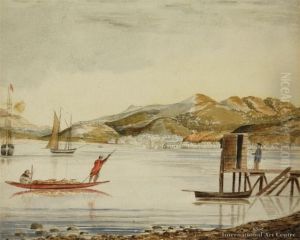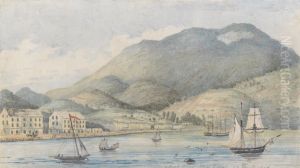Charles Emilius Gold Paintings
Charles Emilius Gold was a notable figure in the 19th century, primarily recognized for his multifaceted career as an artist, soldier, and public servant. Born in 1837, his life spanned an era of significant change and development in the British Empire, allowing him diverse experiences that influenced his work in various fields. Gold's contributions are particularly remembered in the context of New Zealand's colonial history, where he played a significant role during a pivotal period.
Gold embarked on his career in the British Army, which was a common pathway for men of his background during the Victorian era. His military service took him to various parts of the British Empire, including New Zealand, which was then undergoing significant colonial expansion and conflict. It was during his time in New Zealand that Gold's artistic talents came to the fore. He documented military campaigns and landscapes, providing a unique visual record of the period. His works are valuable not only for their artistic merit but also for their historical significance, offering insights into the colonial experience and the interactions between European settlers and indigenous Maori populations.
Beyond his military and artistic endeavors, Gold also engaged in public service, contributing to the development of the areas where he was stationed. After retiring from active military service, he continued to work in administrative roles, further influencing the shaping of colonial New Zealand. His legacy is thus multifaceted, encompassing his contributions to the British military, colonial administration, and the arts.
Charles Emilius Gold passed away in 1904, leaving behind a body of work that continues to be studied and appreciated for its historical and artistic value. His paintings, in particular, are sought after by collectors and historians, serving as a window into a bygone era. Gold's life and work exemplify the diverse roles played by military personnel in the British Empire and highlight the intersection of art, history, and colonialism during the 19th century.

